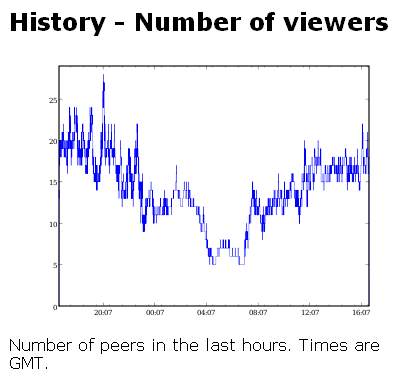 A group called the P2P-Next Consortium is testing what they're calling "a next generation Peer-to-Peer (P2P) content delivery platform." They're hoping to develop software capable of offering P2P-based streaming, and they're inviting the public to help them gather data.
A group called the P2P-Next Consortium is testing what they're calling "a next generation Peer-to-Peer (P2P) content delivery platform." They're hoping to develop software capable of offering P2P-based streaming, and they're inviting the public to help them gather data.
If you're interested in helping you need to use a BitTorrent client, called SwarmPlayer. Once you have it installed you can watch either a 5 minute Video On Demand (VOD) test stream provided by the BBC or a webcam feed from Amsterdam. SwarmPlayer sends performance data back to a P2P-Next server which they'll use in future development.
You can also give them feedback on the project, as well as viewing some information about the ongoing experiment.
As you can see from the graphic they have a long way to go in order to get enough users to accurately simulate the demands you would expect to see put on a real world video server. In order to accomplish this they're asking everyone who tries out the software to leave it running as long as possible, which should eventually result in enough traffic to get the data they need.
Heading the P2P-Next project is the Tribler Team, who also developed the open source SwarmPlayer software. Their goal is to develop a P2P architecture capable of offering the features of traditional media like television and radio, and also enabling users to create and share their own content.
For more information on this test you can visit the official website. You may also be interested in the P2P-Next and Tribler websites.
You can also give them feedback on the project, as well as viewing some information about the ongoing experiment.
 |
As you can see from the graphic they have a long way to go in order to get enough users to accurately simulate the demands you would expect to see put on a real world video server. In order to accomplish this they're asking everyone who tries out the software to leave it running as long as possible, which should eventually result in enough traffic to get the data they need.
Heading the P2P-Next project is the Tribler Team, who also developed the open source SwarmPlayer software. Their goal is to develop a P2P architecture capable of offering the features of traditional media like television and radio, and also enabling users to create and share their own content.
For more information on this test you can visit the official website. You may also be interested in the P2P-Next and Tribler websites.












